Liliett Alarcon’s home in Cuba is filled with the joyful sounds of Caribbean music when her son is playing his drum set. Manuel, 18, is passionate about playing the drums, bongos and the flamenco cajón. It’s a special type of drum that he sits on to play.
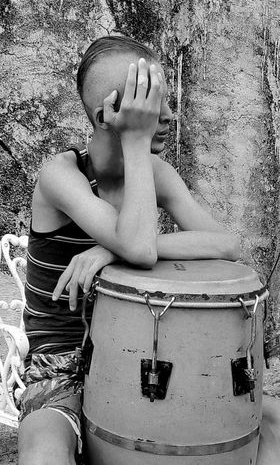
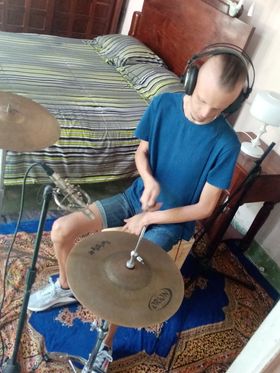
But the Caribbean weather—very hot and very humid—can be tough at times for Manuel since he doesn’t sweat. He was diagnosed at 2.5 years old with hypohidrotic ectodermal dysplasia (HED). It’s especially a challenge when the electricity isn’t dependable in their country. Liliett says that the heat of the day can be especially tough.
“Manuel knows how to face the challenges [of HED], although it is becoming much more complex due to the terrible electricity situation in Cuba. Daytime is more severe for him without having electricity due to the heat. The nights are hard, too. It is very overwhelming for him not being able to rest or sleep at times. It’s very stressful for him and for me. It gives him a lot of anxiety. It’s exasperating and he suffers a lot.”
When he was younger, Manuel would often feel ill at school from the heat even though his classroom had a fan. His teachers would often send him home. As he grew older, Manuel learned how to better manage the heat. Hydration is a very important factor. Walking the beach and swimming in pools are two things he loves to do to cool off.
Learning To Care for Himself
The teen has the classic symptoms that come with having HED: sparse hair, absence of eyebrows, dark shadows under his eyes, dry skin, allergies, respiratory infections, nasal concretions and hardened secretion in his ears. According to Liliett, Manuel has learned to take good care of himself, especially protecting his skin from the hot sun of their country.
“He likes to take great care of his personal appearance, the care of his skin, his hair – feeling comfortable with what he likes and enjoying it.”
His proud mama loves how comfortable he is in his skin and how friendly he is. She says that he is a very happy young man. Many people where they live know him, and he has many friends. Like most teens, the 12th-grader likes hanging out with his friends and going to concerts and shows.
How Dentures Have Helped
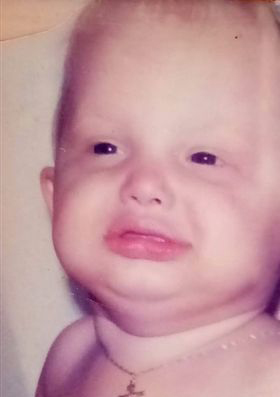
Lilliet made sure he got his first pair of dentures when he was just a little guy. Part of her reason was for him to feel good about himself.
“I wanted Manuel to get dental treatment to improve his appearance and make him feel more secure. I wanted him to be able to accept himself from a young age, with his physical characteristics, and not feel any kind of complex when surrounded by other children.”
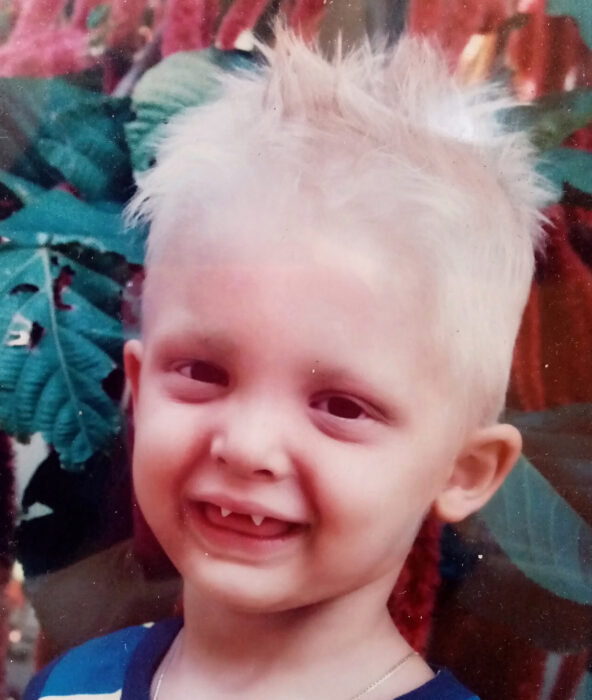
Manuel has just seven teeth. She knew dentures would improve his chewing and his digestive process.
“We started Manuel’s dental treatment when he was only 4 years old, with his first removable upper and lower prostheses and the reconstruction of his incisors, which were conical shaped. The dentist reshaped them to prevent injury and improve his oral and aesthetic appearance.”
As he’s grown, Manuel has had many revisions and prosthesis changes. Liliett says he gets lesions on his gums when he has had a growth spurt and the denture isn’t fitting his jaw properly. That’s when they know it’s time for new dentures. Even as a youngster, Manuel adapted well to his new teeth.
The doctors and prosthetic technicians spoke a lot with Manuel at each appointment. They gave me instructions on how they’d proceed. It wasn’t that easy. But, Manuel accepted his new little teeth from the moment he saw them for the first time.
– Liliett
Their Caring Crew
Supportive friends and a great team of doctors have helped the Alarcons on their ectodermal dysplasias’ journey. Ever since Manuel was diagnosed with this condition, Liliett says their family, closest friends, neighbors, Manuel’s own friends, and his doctors have all wanted to learn about ectodermal dysplasia and how it affects him. They educate themselves so they can better understand and help him live his life.
“Thank God, I have had the unconditional support of wonderful doctors and health personnel. First and foremost, I would like to infinitely thank his doctor, Ronaldo Santander, a specialist with the highest degree in pediatrics and intensive care, an excellent doctor and above all, a friend. He has vast experience and has accompanied us for all of these 18 years. To all the doctors who have treated him inside and outside of our Sancti Spíritus province, in Cienfuegos, Villa Clara and Havana: pediatricians, geneticists, dermatologists, psychologists, gastroenterologists, endocrinologists, ophthalmologists, allergists, immunologists, prosthetic dentists, clinicians, radiologists, nurses, lab technicians … to all of them, our most sincere thanks. Thank you very, very much!”
What Liliett Has Learned
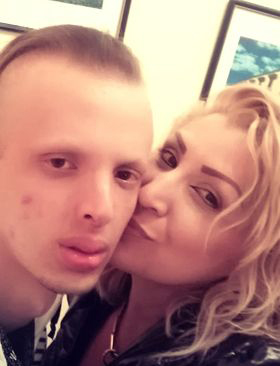
Like any mom of a child with a rare condition, Liliett has learned a lot, too.
“Being that my son is a young man with ectodermal dysplasia doesn’t make him different,” Liliett said. “He is very special to all the people who know him. I have had a very important and unique purpose to be a strong and fighting mother. My first purpose in life is my son. His life experience has also made me grow.”
The dedicated mom encourages new parents to find all the information they can about their child’s conditions. Getting help, especially from geneticists and psychologists, is very important she says. Armed with knowledge, you can help your child believe they can do anything.
“Do not practice overprotection with them. Do not limit them on what they are capable of doing and achieving. It is our duty to educate them on how to live with ectodermal dysplasia. They are strong boys, sure of themselves and can manage to fit into the society in which each of them lives. Always support them!”
A Mama’s Dreams
Liliett has many dreams for her son. She hopes he can someday get dental implants. They would also love to attend a National Foundation for Ectodermal Dysplasias (NFED) Family Conference. While they have been a part of the NFED since Manuel was three years old, their family has not yet been able to meet other families.
“Above all, I dream for him to be a happy and fulfilled young man and adult, to never feel different for living with ectodermal dysplasia,” Liliett said. “I want him to achieve being a professional in his music and on his instruments. I dream that he can study, if he wants a university career. I hope that he gradually overcomes the fears he sometimes feels and that he is more sure of himself. I want for him to always be accepted as the wonderful human being that he is.”
We share Liliett’s dream for Manuel and hope that he achieves that and more!
Share Your Story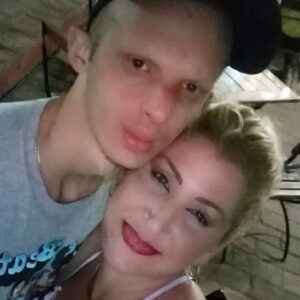
Hi I’m steven from England I’m a 64 yr Old male with H.E.D,what a remarkable young man who also has a very strong mum,
I visited Cuba in 2008,(varadero) My wife and I visited Havana,that was the day I nearly died of heat stroke, the Sun was high in the sky and cast no shadows,I was overcome by the heat,I became angry and agitated my wife also a strong woman,found a restaurant and the owner took one look at me,and could see I was in danger,my face was ashen I was in a state of desperation,my wife and the owner got me inside and he put us in a room with Air con on full,not that I could feel it I was well past the quick cooling stage,he fetched me a bucket of ice,by this time I was just sat in my pants,3hrs passed by and I had the strength to make my way back to the air conditioned coach,
My wife and the owner of the restaurant saved my life that day,
I love Cuba they have little but have a lot to give and am forever grateful
I’ve trimmed the story down,